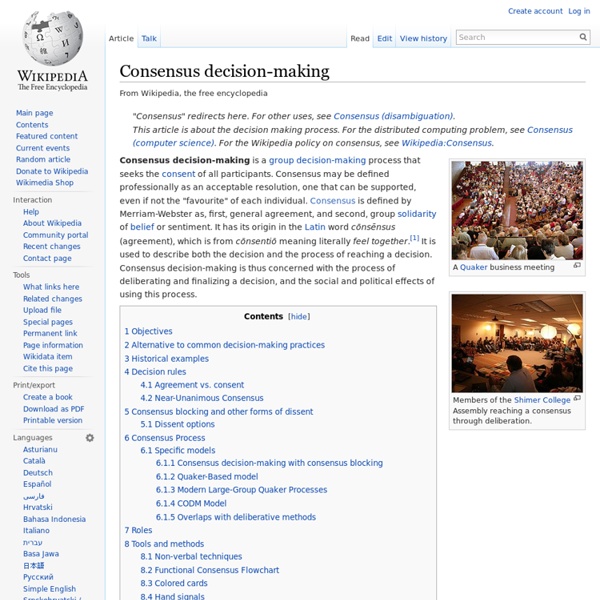Consensus decision-making

Group Systems
Brainstorming and Voting Amazingly Easy. Free Online Tool | tricider
Jack Reeds - Consensus decision making. 02/08 by V RADIO
follow Call in to speak with the host On this edition of V-RADIO we are happy to once again have Jack Reed of the Community Planet foundation to discuss consensus decision making. Tags: Zeitgeist The Venus Project Green Party Libertarian Jacque Fresco h:17838s:1527177archived Recommended For You Comments
Annual Rainbow Gathering - 2012 Edition - Annual Rainbow Gatherings
The Annual Rainbow Family Gathering is celebrated during the first week of July (1st - 7th) and is hosted in a different National Forest within the United States. Since approximately 1972 there has been an Annual Rainbow Family Gathering every year with some states having hosted more then one Gathering within it's borders. Of all the various types of Rainbow Family Gatherings, The Annual Rainbow Family Gathering of the Living Light is by far the largest of Family Gatherings. In high years the mass of family can exceed 30,000 souls and has also enjoyed the energy much the same with as few as 7,000 belly buttons in attendance. These rather large freeform gatherings are attended by a broad and diverse spectrum of people although the hippie movement has a larger appeal to the media. This is an open freeform counsel process that allows for all views and conciderations. Submenu Back in History - Refresh
SIBITE
CreativeApplications.Net | Apps That Inspire...
A Guide to Formal Consensus
Decisions are adopted when all participants consent to the result of discussionabout the original proposal. People who do not agree with a proposal areresponsible for expressing their concerns. No decision is adopted untilthere is resolution of every concern. When concerns remain after discussion,individuals can agree to disagree by acknowledging that they have unresolvedconcerns, but consent to the proposal anyway and allow it to be adopted.Therefore, reaching consensus does not assume that everyone must be incomplete agreement, a highly unlikely situation in a group of intelligent,creative individuals. Consensus is becoming popular as a democratic form of decisionmaking.It is a process which requires an environment in which all contributionsare valued and participation is encouraged. This book contains the building materials for just such a process. The Structure of Formal Consensus Formal Consensus is presented in levels or cycles. Each level has a different scope and focus. 1. 2. 3.
Statement of beliefs of the Ontario Consultants on Religious Tolerance (OCRT)
About this website Sponsored link. The importance of faith/belief statements: We feel that every denomination, para-church organization, religious group, and religious web site should consider creating a statement of belief or faith and displaying it prominently. That said, the following is our attempt at a statement of belief. OCRT Statement of Belief: We are a multi-faith group. We believe in: About accuracy in our essays: We will attempt to overcome our biases on each topic that we describe, by explaining each point of view carefully, respectfully and objectively. We believe that our website is unique among religious websites in that it contains an errata page where we record errors that have been detected and corrected from among our 6,050 essays and menus (as of 2012-DEC). About our use of the BCE/CE date notation: We abandoned use of the traditional AD/BC notation for identifying years. Related essays on this web site: Sponsored link: Footnotes, mainly about exceptions: Site navigation:
How it Works
Here is how the Crowd Wise method can be implemented in practice through four easy steps: Starting with an open question, which could be anything from ‘what should we spend our money on next year’ to ‘ what’s the best way to tackle urban poverty? . A range of options is developed, as opposed to just two alternatives: A range of options is considered as opposed to just two alternatives: Options can be pre-developed or defined as part of an event. An initial Consensus Vote takes place - stakeholders rate the options according to their preference: Results from this initial phase are counted and recorded. • options are now discussed constructively amongst stakeholders (this process can take place over 2 – 3 hours or a much longer period) • understanding amongst all parties increases; there is openness to other people’s point of view • as the discussion progresses, options start to get modified or merged to reflect growing consensus • a second Consensus Vote helps identify where consensus lies
Guerrilla Translation! | Exporters of fine interlinguistic memes
Related:
Related:



